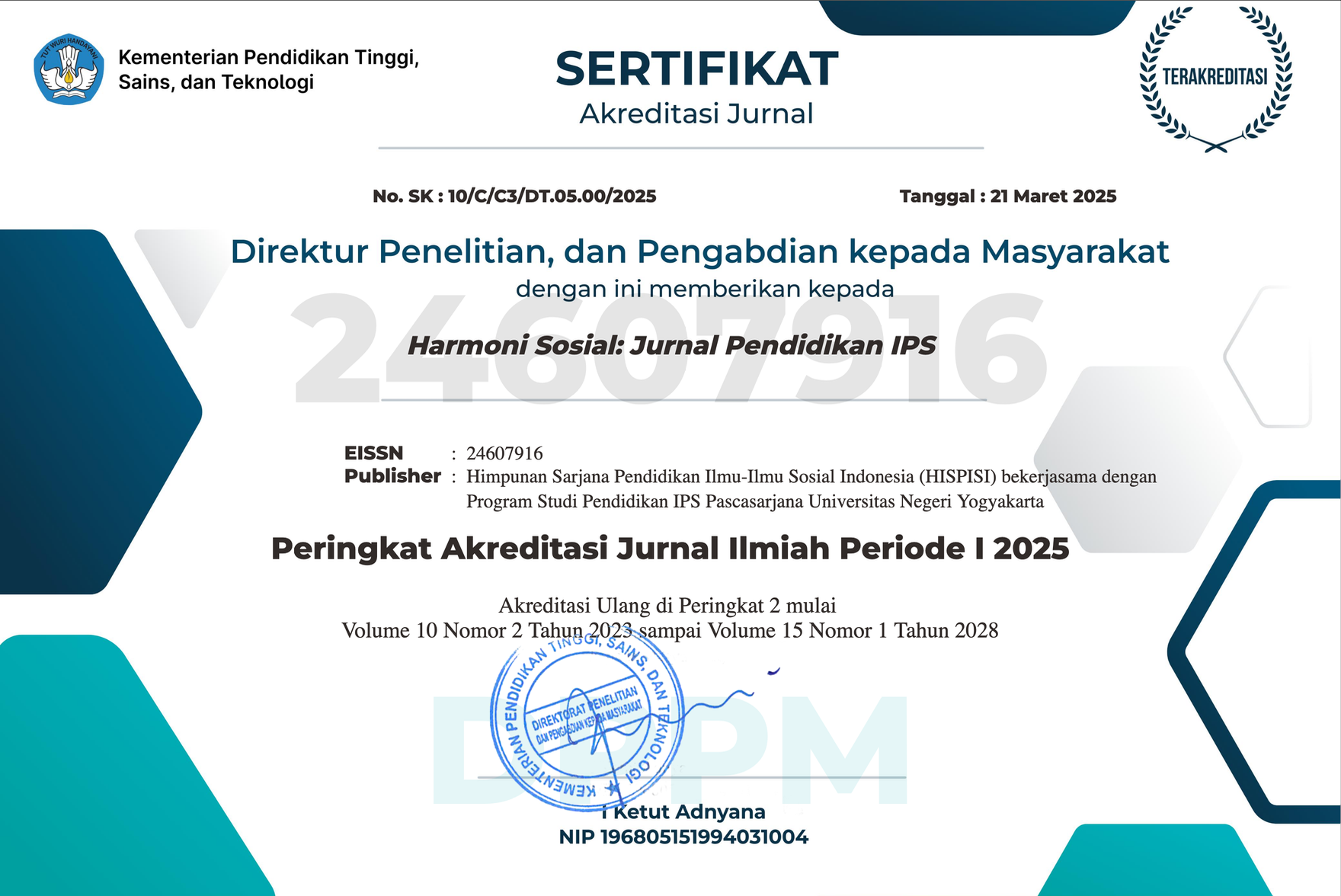The effect of multicultural attitude, learning style, and parents' job on the learning achievement of the students
Downloads
Downloads
Abosede, S. C. (2015). Gender, parents' job-type and family size as determinants of junior secondary school students' academic performance. International Journal of Humanities and Social Science, 5(4), 75-81. Retrieved from http://citeseerx.ist.psu.edu/viewdoc/download?doi=10.1.1.1050.9701&rep=rep1&type=pdf
Arshad, M., Shahzadi, E., & Mahmood, A. (2016). Parents involvement at university level education: Students perception in under developing country. European Scientific Journal, 12(22), 294-304. doi: http://dx.doi.org/10.19044/esj.2016.v12n22p294
Banks, A. (2007). Educating citizens in a multicultural society. New York: Teacher College University.
Banks, A. (2009). The Routledge international companion to multicultural education. New York: Routledge.
Bernal, A., Urpí, C., Rivas, S., & Repáraz, R. (2011). Social values and authority in education: Collaboration between school and families. NASPA Journal About Woman in Higher Education, 5(2), 134-143. Retrieved from https://pdfs.semanticscholar.org/651b/f270e3142b1b76cbbb5c9a6344325e0cf356.pdf
Berns, R. M. (2010). Child, family, school, community: Socialization and support eight editions. California: Wadsworth.
Billings, G. L., & Gillborns, D. (2004). Multicultural education. London: Routledge Falmer.
Braster, S., & Dronkers, J. (2013). The positive effects of ethnic diversity in class on the educational performance of pupils in a multi-ethnic European metropole. London: Centre for Research and Analysis of Migration.
Cruickshank. D. R., Jenkins, D. B., & Metcalf, K. K. (2014). The act of teaching (6th ed.). (G. T. Pratiwi, Trans.). Jakarta: Salemba Humanika.
Dronkers, J., Van der Velden, R., & Dunne, A. (2012). Why are migrant students better off in certain types of educational systems or schools than in others?. European Educational Research Journal, 11(1), 11-44. doi: https://doi.org/10.2304/eerj.2012.11.1.11
Dusi, P. (2020). The family-school relationship in primary education. Parents' perspectives in the age of "the minimal self". International Journal About Parents in Education, 12(1), 13-25. Retrieved from http://www.ernape.net/ejournal/index.php/IJPE/article/view/369
Fernandez, E. S. (2014). Teaching for a culturally diverse and racially just word. Eugene: Wipf and stock publishers.
Gilakjani, A. P. (2012). Visual, auditory, kinaesthetic learning styles and their impacts on English language teaching. Journal of studies in education, 2(1), 104-113. doi: http://dx.doi.org/10.5296/jse.v2i1.1007
Gu, H., Yin, L., & Li, J. (2015). Making homework a catalyst of teacher-parents-children's collaboration: A teacher research study from an elementary school in China. International Journal about Parents in Education, 9(1), 47-65. Retrieved from http://www.ernape.net/ejournal/index.php/IJPE/article/viewFile/308/239
Hamalik, O. (2013). Kurikulum dan pembelajaran. Jakarta: Bumi Aksara.
Hassan, J. E. (2009). Parents' socioeconomic status and children's academic performance. Report of Norwegian Social Research, NOVA Notat, 7(09), 1-60. Retrieved from https://fagarkivet.oslomet.no/bitstream/handle/20.500.12199/5214/3827_1.pdf?sequence=1&isAllowed=y
Knowles, G., & Lander, V. (2011). Diversity, equality and achievement in education. Chennai: C & M Digitals (P) Ltd.
Marrison, D. L., & Frick, M. J. (1994). The effect of agricultural student' learning styles on academic achievement and their perceptions of two methods of instruction. Journal of Agricultural Education, 35 (1), 26-30.
Marrison, D. L., & Frick, M. J. (1994). The effect of agricultural students' learning styles on academic achievement and their perceptions of two methods of instruction. Journal of Agricultural Education, 35(1), 26-30. Retrieved from https://www.researchgate.net/profile/Martin_Frick2/publication/238521723_The_Effect_Of_Agricultural_Students'_Learning_Styles_On_Academic_Achievement_And_Their_Perceptions_Of_Two_Methods_Of_Instruction/links/004635304f0584caf4000000.pdf
Maruyama, G., Moreno, J. F., Gudeman, R. H., & Marin, P. (2000). Does diversity make a difference?: Three research studies on diversity in college classrooms. Washington DC: American Council on Education – American Association of University professors.
Mendel, M. (2020). Education is power and parents are force. International Journal about Parents in Education, 12(1), 1-7. Retrieved from http://www.ernape.net/ejournal/index.php/IJPE/article/view/367/275
Munroe, A., & Pearson, C. (2006). The munroe multicultural attitude scale questionnaire: A new instrument for multicultural studies. Educational and Psychological Measurement, 66(5), 819-834. doi: https://doi.org/10.1177/0013164405285542
Parekh, B. (2000). Rethinking multiculturalism: cultural diversity and political theory. London: Macmillan Press Ltd.
Separsa, A. A. G. A., Lasmawan, I. W., & Suarni, N. K. (2014). Pengaruh implementasi teknik klarifikasi nilai terhadap prestasi belajar PKN dengan kovariabel sikap multikultur pada siswa kelas VIII SMP Negeri 1 Payangan. Jurnal Penelitian dan Evaluasi Pendidikan Indonesia, 4(1). Retrieved from http://119.252.161.254/e-journal/index.php/jurnal_ep/article/view/1175
Slameto, S. (2013). Belajar dan faktor-faktor yang mempengaruhinya. Jakarta: Rineka Cipta.
Slavin, R. E. (2011). Educational psychology: Theori and practice (9th ed). (M. Samosir, Trans.). Jakarta: Indeks.
Suleman, Q., Aslam, H. D., Hussain, I., Shakir, M., & Zain-un-Nisa, Z. (2012). Effects of parental socioeconomic status on the academic achievement of secondary school students in Karak district Pakistan. International Journal of Human Resources Studies, 2(4), 14-31. doi: http://dx.doi.org/10.5296/ijhrs.v2i4.2511
Suyanto, S., & Jihad. A. (2013). Menjadi guru profesional. Bandung: Erlangga.
Syah, M. (2013). Psikologi pendidikan dengan pendekatan baru. Bandung: PT. Remaja Rosdakarya.
Tanta, T. (2010). Pengaruh gaya belajar terhadap hasil belajar mahasiswa pada mata kuliah biologi umum Program Studi Pendidikan Biologi Universitas Cendrawasih. Jurnal Kreatif: Jurnal Kependidikan Dasar, 1(1), 7-21. doi: https://doi.org/10.15294/kreatif.v1i1.1666
Van Vuuren, N. (1991). Work and career: Manage work outside and within the home. (A. G. Lurandi, Trans.). Yogyakarta: Kanisius.
Zamroni, Z. (2011). Pendidikan demokrasi pada masyarakat multikultural. Yogyakarta: Gavin Kalam Utama.
The Authors submitting a manuscript do so on the understanding that if accepted for publication, copyright publishing of the article shall be assigned to Harmoni Sosial: Jurnal Pendidikan IPS
 | Harmoni Sosial: Jurnal Pendidikan IPS by http://journal.uny.ac.id/index.php/hsjpi is licensed under a Creative Commons Attribution-ShareAlike 4.0 International License. |









 ISSN Print
ISSN Print










